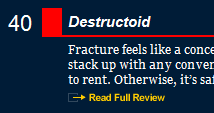
The PEOWW Conference: Jim Sterling
Rich
Jim Sterling is the Reviews Editor over at Destructoid (nice site, shame about the community) and is well-known in the industry for his uncompromising review style, cutting wit and… for wearing a monocle.
After an interesting year (a well-publicised 24 hour stint on Singstar for charity, a marriage and a move over to the United States) PEOWW decided to catch up with him and talk about some of the issues facing gamers and gaming website these days.

Peoww: Hi Jim, thanks for talking to PEOWW. So I guess the first thing we need to ask you is how did you get into this ‘writing about games’ business?
Sterling: Natural progression, really. I had actually been trying to break into the comedy business beforehand, but never quite understood that I preferred writing material rather than performing it. I’d been doing some incredibly small-time videogame reviews for a now defunct Web site, but never thought to try and make a career out of it because I don’t know what’s good for me.
One day I did, and had to confess to myself that I was actually much better at it than comedy.
Peoww: How did you get involved with Destructoid and does the success of the site surprise you? Two million readers a month for an independent site that’s only two years old is pretty good going!
Sterling: I was reading an issue of GamesTM when I saw an article on how people make money from the games industry. I was attempting to break into games media at that point, so I was naturally interested. One section was about videogames journalism and Destructoid was featured. By that point I’d already secured a freelance gig with IGN Insider, so I think that made me look promising to Niero and Nick Chester. I sent them the old spiel — “big fan of your site, would love to write for you” etcetera. It worked.
As for the success of the site, it was already doing huge traffic when I got there, so I never saw the massive explosion that older writers were around for. I’d say I’m more surprised that I ever managed to be successful there, personally.
Peoww: As the reviews editor do you get to pick and choose the games you want to review or do you find yourself letting other people review the bigger games so that you can enjoy them at your leisure?
Sterling: Review duties are mostly split between myself and Nick. As editor-in-chief, Nick often gets a lot of early game code so he can get reviews done fast. We generally have a very open system. I’ve got a release schedule of games and my core review team can look through it and sign up for whatever game they want. Each member of my team generally has a different interest, so we rarely step on each others’ toes. So far the system works well.
Peoww: Has there been times where you’ve vetoed a review? What’s worse – seeing a bad game get a good review or seeing a gem get ripped apart? On this site there is a fairly large group of us who really like Two Worlds but that got a panning everywhere and even cult titles like EDF received plenty of bad reviews.
Sterling: I’ve never had to veto a review, and I like to think I’d never do that. My main job is making sure the text as written falls in line with the numerical score awarded. As far as the writer’s opinion, that’s their deal. Despite working together closely on reviews, Nick and I tend to have polar opposite views on games. We “fight” over games a lot, but we respect that each man’s opinion is his own. Even though all of Nick’s opinions are blatantly wrong and he’s an unrelenting sex pest.
As far as what is worse to see, I do hate to watch a game with huge flaws get glossed over. That’s the power of hype though.

Peoww: How much pressure does a site like Destructoid get from software companies to give good reviews? There have been a couple of high profile stories recently about this with Atari and Eidos trying to delay bad reviews of Alone in the Dark and the new Tomb Raider. Does Destructoid’s independent status protect them from that kind of pressure?
Sterling: I have no problem pissing off a publisher, but then, it’s not me that has to talk to most of them. We’ve upset people, certainly. Some publishers want nothing to do with certain reviewers, for example.
Most of them are big enough to take it on the chin. Sega Europe, for example, are a great bunch of guys who have always been graceful, regardless of the ratings we give their games. A lot of PR folk are cool people. If anything, the only pressure comes from not wanting to upset those that you’ve gotten to really know and like. You have to give the review to someone else if you think it’ll be too personal though.
Peoww: Destructoid uses a 10 point scale which you recently redefined in order to make things clearer. Given the choice would you switch it to a different scale? Perhaps marking out of 100 or even just using a buy/rent/avoid type system?
Sterling: I try and take as much thought out of review scores as possible. That’s why each number has its own summary. A reviewer is meant to write the text, then line up the tone of the text with the score summary and find which is appropriate. I think it’s ridiculous to write a review and then independently go “I think I’ll give this a 7” or whatever.
I like the ten-point scale, allowing for maybe a .5 here and there. 100 points are too unwieldy, I think. What, exactly, is 72 or 38? There is no way you can choose a percentage score without it being completely arbitrary. I like the system we have. It’s incredibly self-explanatory.
Peoww: As the Reviews Editor, do you have the option to change the score if it isn’t reflected by the text or would you always go back to the reviewer?
Sterling: I read through each review before it’s posted. If I felt the score did not reflect the text, I’d talk it through with the writer first. We had one issue a while back with the Fracture review, where we felt the text and the score did not sync up, among other problems. This was before I was more strict with review posting. We had it re-reviewed, and I feel the score was a lot more accurate … but not much more flattering.
That was a learning curve for me. Destructoid started off as a bunch of guys just dicking around, we’re all learning to be professionals. I fully admit that I am learning as I go with this reviews editor gig. I’ve never been an anything editor before.
Peoww: Will we ever see games journalism ever get away from thinking that 7 means average? Even the Atari/Eidos stories recently were based on the idea that anything under an 8 means ‘bad’.
Sterling: We probably won’t. People have a hard time adjusting to our scale and throw incredible hissy fits when something doesn’t jive with industry standards, whatever those are. Amusingly, most readers will continue to mock the “IGN” scale while being confused by a true ten-point one.
I don’t think it’s just games media though. Anything below a seven looks bad in all things. Must be some strange human brain deficiency.
Peoww: Do you think things like the Wii’s Virtual Console or the Xbox’s Arcade is a good way to get kids into classic retro games or an attempt by greedy publishers to keep wringing money out of old intellectual properties?
Sterling: It can be both. I think each platform’s digital distribution methods are great ways to bring back some old games, sometimes with extra features, but they’re obviously a nice quick buck as well. What I want to see is more games like Castle Crashers — brand new games with retro flavors. CC brought back the old school brawler genre, and I don’t think such a feat would be possible in the retail marketplace

Peoww: Do you think the general perception of videogames has changed in the last few years or is it still the domain of the nerds and shut-ins?
Sterling: That all depends. You could argue that the Wii has helped change the perception of videogames, but I also think the Wii changed what videogames are, and not always for the best. Stuff like Wii Sports Resort or Wii Music are not what I’d like to think of as videogames (but that’s not my call). Ultimately, videogames are changing to cater to what some would term “real” people, appealing to the iPod generation and the people who think FOX News is a credible source of information. However, I don’t think the “nerds and shut-ins” stigma will ever go away — Nintendo of America does a great job of drawing that distinction and letting the “real” people know who the freaks are.
Peoww: With Peter Moore recently saying that EA need to focus on casual gamers and with Nintendo more or less ignoring the so-called ‘hardcore’, can you see gaming eventually becoming something that you’ll get bored of or are you a fan of the new gaming trends introduced by the Wii and DS?
Sterling: Well, I think you can already deduce my opinion on most “casual” games from the last answer. I don’t think the kind of games we “hardcore” folk love will ever really go away though. They make too much money for that. We will also continue to see obscure classics like Killer 7 or Okami being made, even if they don’t sell well, because there are still visionaries in this industry, however well hidden they may be.
There is room for what many call “casual” games and “hardcore” games in this industry, and titles will be made to appeal to all sorts of demographics. I try to shy away from calling games casual or hardcore, really. I think the only real distinction to be made is between good games and shit games.
Peoww: One of our mutual readers says ‘ask him about why he left us for the colonies (he’s just about to / moved to the US)’. Will you continue writing and do you hold down a regular day job or do you write full time?
Sterling: I moved to the US just last week, actually. I did this because it’s hard to marry someone from America if you’re sitting in England. Relationships tend to favor proximity.
I will continue to write, of course, because I have no other talents (and even the writing is questionable in that regard). I was recently able to quit full-time work and now write for a living. At least, that’s what I’m trying to do. It’s still in the trial phase right now, but hopefully I can devote all my time to games media instead of having to spend all night in a South London cab office.
Peoww: Do you have any favourite games journalists from the past and present and have they influenced you in any way?
Sterling: Penny Arcade’s Tycho Brah is a bit of a writing love of mine. I must confess that I have learned from his ability to italicize seemingly meaningless words to create an incredibly funny emphasis. Another favorite is GamePolitics’ Dennis McCauly. One of the few writers in this industry that I would call a “journalist.” He’s also a really nice chap.

Peoww: You recently wrote a fairly strong article titled ‘Why people who whine about review scores are wankers’. What was the most extreme or or just plain weird reaction you ever received from one of your reviews or features?
Sterling: I would have to say that the reaction to my Patapon review was pretty amazing. I gave the game a 6.5, which marked it as a decent game, and I felt that I clearly explained why I did not consider it a great game. Cue News4Gamers and its wonderfully melodramatic community, and suddenly we get the phrase — “It’s official. Destructoid hates innovation.”
I was also told that rating GTA IV an 8.0 was “flying in the face of every other review out there.” Apparently, saying Grand Theft Auto IV is “great” is some act of rebellion. Sorry I did not think it was perfect!
Peoww: What kind of advice can he give people for if they ever have undertake a marathon Singstar karaoke session for charity?
Sterling: Do it at Wardrox’s house.
Peoww: What are your views on DLC? Peoww’s official standpoint is that we want everyone connected with Namco to die in a fire.
Sterling: I’d agree with that, with the one condition that you download fuel for the fire at 200 Microsoft Points per log.
Peoww: One last reader question: “Oh and ask him what’s the worst sonic game he’s ever played and why do Sega keep molesting my childhood so?”
Sterling: I only ever played the demo for Sonic 2006, but it really is breathtakingly bad. The game is so buggy and poorly designed that I found myself being impressed. A game so terrible it’s impressive, that’s quite an achievement.
Shadow the Hedgehog was probably the worst Sonic game I’ve played in full. Sonic Advance 2 & 3 are also rather dire.
As for Sega molesting your childhood, it shouldn’t wear such short skirts, the little minx.
Well there you have it. You can check Jim Sterling’s work out at Destructoid and the associated Podtoid podcast.
